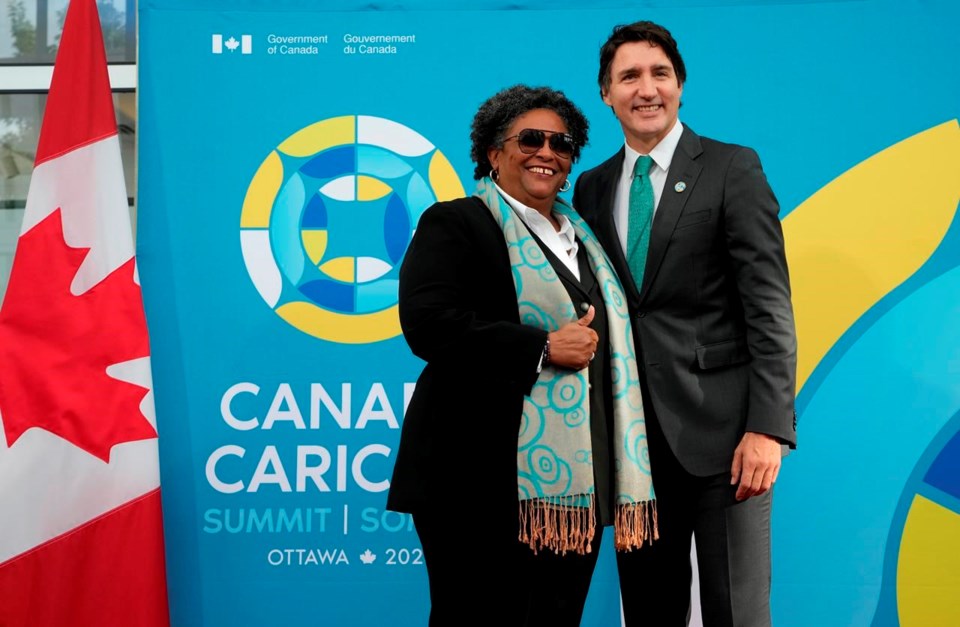OTTAWA — Caribbean leaders are asking Canada to ramp up its advocacy for reforming global financial institutions so that smaller states can tackle climate change.
They are also hoping an international military intervention in Haiti might be able to stem the flow of guns to other island nations.
Those themes loomed large as Prime Minister Justin Trudeau hosted atwo-day summit in Ottawa aimed at forming closer ties with the region.
The Caribbean Community, known as CARICOM, includes 15 countries and five overseas territories, spanning from Bahamas to Trinidad and Tobago, but not including Cuba.
Trudeau said Canada sees these countries as partners in a turbulent world.
"It is now more clear than ever that economic policy is security policy, is climate policy, is social policy — everything is interconnected," he said.
"These are serious, consequential times. As strategic partners, as friends, if we want to protect our people, if we want to deliver for our citizens, we have to work together."
The leaders kicked off Wednesday with a discussion on climate change, and biodiversity, followed by a discussion about the reform of lending institutions.
In recent years, Caribbean states have described a dilemma in which they are now middle-income countries that don't qualify for the same financing as parts of sub-Saharan Africa.
That leaves them economically devastated from large hurricanes, while not being able to afford infrastructure that could weather such storms.
Barbados Prime Minister Mia Mottley said it's a problem institutions such as the International Monetary Fund and the World Bank are not designed to face.
"We come to these meetings and we're not getting the needle moving because ofthe absence of political will," she told her fellow leaders.
"Canada has the potential not just to be a leader in this, but to also start to be able to help us speak truth to power."
Mottley has helped lead countries to propose new funding mechanisms, such as a vulnerability matrix that takes into account the economic capacity of small countries alongside their exposure to disastrous climate events.
Canada has raised the need for a reform at multiple global forums, including during Foreign Affairs Minister Mélanie Joly's address last year to the United Nations General Assembly.
Mottley noted there are a "remaining few countries who are blocking progress" to a reform, without naming which states.
"We literally collapse the capacity of countries to respond in ways that are necessary for people's lives to be maintained," she said.
Trudeau and Mottley co-chair a UN advocacy group for Sustainable Development Goals, and have focused on trying to help smaller states who are grappling to economically recover from effects of the COVID-19 pandemic while facing natural disasters.
On Wednesday afternoon, leaders also discussed the political and humanitarian crises in Haiti, in the hopes of ending gang violence that threatens to spread through the Caribbean.
Trinidad and Tobago Prime Minister Keith Rowley said guns are already spreading across the region and leading to multiple-casualty shootings involving assault weapons.
"We have seen an explosion in the use of illegal arms and ammunition, on a daily basis," he said, arguing almost every Caribbean state is seeing gangs armed better than police.
Rowley said leaders have asked the U.S. to help cut down on the trafficking of arms, and he said they'd like Canada's help with obtaining small boats to help patrol coastlines.
This week's meetings mark the first visit to Canada by Haitian prime minister Ariel Henry since August 2021, when he assumed the role without having been elected, following the assassination of the country's president.
Trudeau is pressuring Henry to work with his political opponents, with his office releasing a statement that touches on "the urgent need for a power-sharing agreement between Haitian Prime Minister Ariel Henry and opposition groups."
Henry did not raise concerns with that public callout.
"We hope that we all make progress, and we get to a point where Haiti is no longer on the page of bad news," he told media in French.
This month, the UN Security Council approved a Kenya-led multinational military intervention to clear out gangs that have committed brazen violence and blocked access to essentials.
Trudeausays he hopes Caribbean leaders can help ensure Haiti has stability when that mission ends, by having other Caribbean states and Canada help the country establish effective policing and fight corruption.
The summit comes as Canada seeks votes for its bid to join the UN Human Rights Council.
Dominica Prime Minister Roosevelt Skerrit said the Canadians are long-standing partners of Caribbean states.
"Our region has traditionally relied on Canada's advocacy to highlight our challenges and realities, and promote our interests in international fora where we don't have a voice," he said at the opening of the summit.
On Thursday, the leaders are expected to take part in a trade and investment roundtable, ahead of an afternoon press conference.
This report by The Canadian Press was first published Oct. 18, 2023.
Dylan Robertson, The Canadian Press



